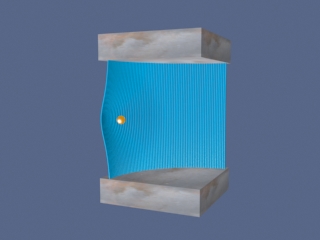| DESCRIPTION:
The animation shows a charge moving toward a region
where the magnetic field is vertically upward. When
the charge enters the region where the external magnetic
field is non-zero, it is deflected in a direction perpendicular
to that field and to its velocity as it enters the field.
This causes the charge to move in an arc that is a segment
of a circle, until the charge exits the region where
the external magnetic field in non-zero. We show in
the animation the total magnetic field-that is the magnetic
field of the moving charge in addition to that of the
external magnetic field. The bulging of the total field
on the side opposite the direction in which the particle
is pushed is due to the build up in magnetic pressure
on that side. It is this pressure that causes the charge
to move in the arc of a circle.
The moving charge in the animation changes its direction
of motion by ninety degrees over the course of the animation.
How do we conserve momentum in this process? Momentum
is conserved because momentum is transmitted from the
moving charge to the currents that are generating the
constant external field. This is plausible given the
field configuration shown in the animation. The magnetic
field stress, which pushes the moving charge sideways,
is accompanied by a tension pulling the current source
in the opposite direction.
To see this, look closely at the field stresses where
the external field lines enter the region where the
currents that produce them are hidden, and remember
that the magnetic field acts as if it were exerting
a tension parallel to itself. The momentum loss by the
moving charge is transmitted to the hidden currents
producing the constant field in this manner.
|


